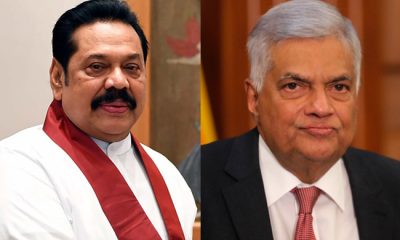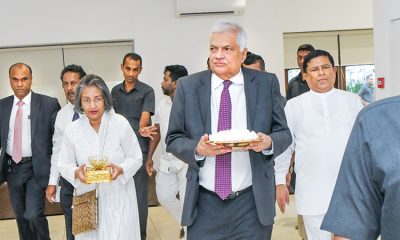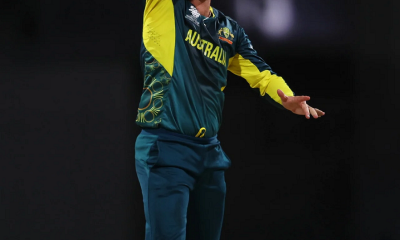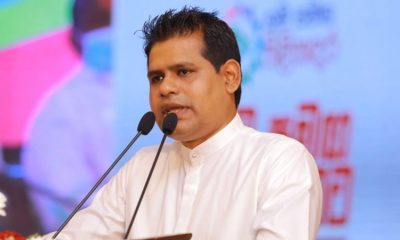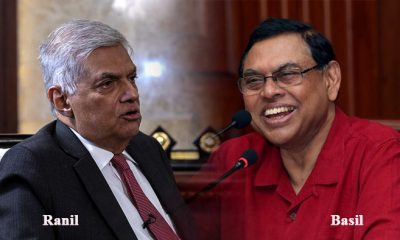Editorial
The way the papadam crumbles

When the five days long stretch of holidays ended last week and the Colombo bourse reopened for trading on Tuesday, the market surged 6.71 percent (633.69 points up) on the broad All Share Price Index (ASPI) while the Standard and Poor SL 20 index covering the 20 largest and more liquid companies quoted on the Colombo Stock Exchange (CSE) leaped 10.29 percent (279.57 points). The ASPI surge was the second highest single day gain since the civil war ended in 2009. Furthermore, the ASPI crossed what market analysts call the 10,000 point “resistance level” for the first time since September 15, 2022, with the day’s market turnover at Rs. 7.42 billion being the highest daily turnover for the year.
President Ranil Wickremesinghe had good reason to celebrate the market reaction to the ongoing debt restructuring and optimization efforts, both foreign and domestic, which had comfortably cleared the parliamentary hurdle the previous Saturday. This was the first time the House had ever sat on a Saturday. A run on the banks, feared by some was attributed to June 30 being declared a special bank holiday to neatly slot into the weekend and two public holidays as a precautionary measure against such an eventuality. This may have been unnecessary, analysts opined after the event. However that be, the performance of financial market including bills and bonds once the total picture was unveiled leaves room for satisfaction. Fears of members of the Employees Provident Fund (EPF), long a captive lender to government, taking a blow in the short to medium term have also receded.
While the country situation has improved immeasurably since last year when both President Gotabaya and Prime Minister Mahinda Rajapaksa vacated office – the president can take most of the credit for that – acute hardship especially on the cost of living front is very much with us. Even the middle class is in a tight bind and the plight of the poor, among them daily wage earners, is almost unimaginable. True, there are occasional favourable newsbytes like a decline in inflation promised to recede further during the course of this year. But anybody shopping for essential groceries are all too aware of prevailing reality.
The rupee strengthened against the dollar and other hard currencies but inevitable market fluctuations remain a fact of life. Cooking gas prices were lowered a few days ago, motor vehicle fuel prices were lowered but since adjusted upward at least where the high demand 92 octane product was concerned. The lower end of the spectrum of electricity consumers will get some much needed relief this month. Taxes have been doubled and prices of some previously unavailable goods have doubled and tripled but the worst fears have not materialized.
We run today a news story about Sri Lankan’s “jumping ship,” leaving the country in droves in a process that began to accelerate in the middle of last year. According to data maintained at the Sri Lanka Foreign Employment Bureau (SLFEB), 122,000 Lankans left the country for work in 2021. This jumped to 311,000 last year. In the first five months of 2023, as many as 122,000 foreign job seekers – same as in the whole of 2021 – had left. Officials admit that these figures may be under-stating reality as many people leaving for Middle Eastern jobs and employment elsewhere in Asia leave on tourist visas and are not registered at the SLFEB. The losses include skilled workers and professionals.
As Central Bank Governor Nandalal Weerasinghe, recalled from retirement in Australia, has said in an interview we run today on the macro-economic picture (see page 11) that the more difficult part of salvaging Sri Lanka’s economy will be the restructure of domestic debt while navigating a political minefield. He is quoted saying: “This is the most challenging part of debt restructuring. It is very politically sensitive, socially sensitive and also there is some impact on domestic (bond) holders,” The process of doing this difficult job has already begun and it must be unequivocally said that Sri Lanka is fortunate that an apolitical professional central banker is at the helm of driving it forward. Undoubtedly it will be no smooth ride and obstacles will surely surface along the way. How well this process will be navigated is an open question with President Wickremesinghe now making fairly clear that he is looking for a second term, this time elected by the people, come November 2024. This would entail sometimes taking decisions aimed at winning votes subordinating the national interest. Depending entirely on what the situation was at the height of the aragalaya, and what it is when people next go to the polls will not be enough.
Whether the government will press on with last week’s attempt via an SLPP Private Member to reconvene local bodies whose tenure has ended remains to be seen. This has revolted most Lankans already seething at their being denied these elections after nominations closed on the excuse there was no money to run them. It must be said in fairness to the president that he may have nothing whatever to do with this attempt to reconvene local bodies which may be a wholly an SLPP affair, allegedly directed by Basil Rajapaksa, that party’s national organizer. Members of local bodies are useful storm troops at election time and this most likely is what’s behind that move. But is the SLPP thinking of running its own candidate at the next presidential election rather than backing RW who its MP’s elected to the presidency in July 2022? However several SLPP MPs have already pledged allegiance to Wickremesinghe.
Editorial
Ensure safety of COPF Chairman

Saturday 8th June, 2024
It was with shock and dismay that we received the news about death threats to COPF (Committee on Public Finance) Chairman Dr. Harsha de Silva over the ongoing parliamentary probe into the on-arrival visa scam. Dr. de Silva yesterday told Speaker Mahinda Yapa Abeywardena, in Parliament, that he was facing death threats and intimidation, and it was incumbent upon Parliament to ensure his safety. He stopped short of naming names, but revealed that some ruling party MPs were among those who had ganged up against him. The Speaker only said there had been no complaint, and he would look into the matter.
The SLPP-UNP government has been doing everything in its power to have all parliamentary committees under its thumb. The COPE (Committee on Public Enterprises), which once helped restore public faith in the legislature by exposing state sector corruption, has now become a mere appendage of the incumbent regime, thanks to the appointment of SLPP MP Rohitha Abeygunawardena as its Chairman. The SLPP-UNP combine also tried to oust COPF Chairman Dr. de Silva, but in vain. However, it knows more than one way to shoe a horse.
The COPF, under Dr. de Silva’s chairmanship, has been a thorn in the side of the government, which is struggling to cover up numerous corrupt deals. Dr. de Silva yesterday told Parliament that he found it extremely difficult to function as the COPF head due to severe resource constraints his committee was facing; he himself had to pay the salaries of some of his staff members besides burning the midnight oil.
The sheer workload he had to cope with as the COPF chief had taken its toll on his health, he said, informing the Speaker that he was at the end of his tether, and at times thought of resigning from the COPF. This is exactly what the government wants him to do; resource squeezes and threats are aimed at making him quit.
On 26 May, Dr. de Silva revealed, in an ‘X’ post, that the COPF had uncovered some vital information about the visa scam and it would reveal everything after its final meeting on the issue; the COPF was committed to exposing the truth behind the controversial tender, he added. In an editorial comment on 27 May, we warned him.
While thanking him for his bold stand, we pointed out that by making such a statement, he had thrown caution to the wind, and become a marked target, with the government making an all-out effort to delay the COPF investigation lest the truth should come out much to the detriment of its interests in this election year. Unfortunately, what was feared has come about; Dr. de Silva is complaining of death threats and government moves to strangulate the COPF financially to derail its investigations.
Dr. de Silva’s predicament exemplifies the fate that befalls the few good men and women in Parliament. It is hoped that all those who seek an end to the state sector corruption will rally behind Dr. de Silva, and bring pressure to bear on the government to ensure his safety. Let Dr. de Silva be urged to reveal the names of those who have issued threats, veiled or otherwise, to him and are trying to scuttle the COPF probes.
Editorial
Dead man walking!

Friday 7th June, 2024
The SLPP-UNP government is going hell for leather to make bad laws as if there were no tomorrow. It is abusing its parliamentary majority, which has been retained with the help of some crossovers, for that purpose. The Opposition, the media and trade unions are up in arms, and understandably so. The incumbent regime is a dead man walking; it is so desperate that it is capable of anything. Hence the need for it to be restrained.
The Electricity (Amendment) Bill (EAB) plunged Parliament into turmoil yesterday, but the government secured its passage. The Supreme Court (SC) determined the entire EAB inconsistent with the Constitution and recommended changes thereto. After unveiling the Bill, sometime ago, Minister of Power and Energy Kanchana Wijesekera hailed it as an excellent piece of legislation aimed at straightening up the power sector to serve the public interest better.
The SC determination left him with egg on his face. He reminded us of the proverbial curate who, while eating a stale egg, assured his host, a Bishop, that parts of it were excellent. Wijesekera’s egg, as it were, made Parliament stink yesterday, but he sought to please his masters by praising it as a silver bullet.
EAB should have been discarded and a new one drafted in consultation with all stakeholders. But the government is apparently driven by an ulterior motive; its aim is not to serve Sri Lanka’s interests but to look after those of some moneybags.
It is not uncommon for Bills to contain some flaws, which are rectified either before or during the committee stage. But there is something terribly wrong with draft Bills that are full of sections inconsistent with the Constitution. The drafters of EAB have demonstrated their sheer ignorance of the supreme law, and that they are not equal to the task of drafting Bills. If they had read the Constitution at least perfunctorily, they would not have drafted such a bad law.
Ignorant and incompetent, they do not deserve to be paid with public funds and must be sent back to law school. They must be summoned before Parliament and questioned on their serious lapses, which have caused public faith in the national legislature to diminish.
Curiously, the MPs who demand that judges, doctors, Central Bankers, and other public officials be summoned before Parliament have taken badly drafted Bills for granted. The power sector trade unions yesterday alleged that EAB was of Indian origin and geared towards furthering the interests of Adani Group at the expense of Sri Lanka.
Most critics of EAB are agreeable in principle to the need for power sector reforms; the Ceylon Electricity Board should be given a radical shake-up, and transformed into a modern organisation capable of providing a better service at a lower cost. They only asked the government to tread cautiously, consulting all stakeholders and taking action to ensure that the country’s interests prevailed over everything else. But the government was in a mighty hurry to steamroller the Bill through Parliament, making the Opposition ask whether it was doing so at the behest of some external forces involved in controversial power generation deals here.
What is passed by the current Parliament can be either amended or abolished by a future parliament in a constitutionally prescribed manner. But that does not mean that a government is free to pass bad laws, making the country enter into long-term agreements with powerful nations and their investors. It looks as if the SLPP-UNP regime did not care two hoots about the consequences of its actions.
Editorial
Modi Magic on the wane

Thursday 6th June, 2024
The outcome of India’s parliamentary election (2024) has led to a ‘perspective ambiguity’. Prime Minister Narendra Modi lost no time in declaring victory for the BJP-led NDA alliance, which secured 293 seats in the 543-member Parliament, but he must be a worried man. The BJP is short of 32 seats to form a government under its own steam; it has lost 63 seats or about 20% of its parliamentary strength. It had 303 seats in the previous Parliament, and that number has dropped to 240.
Modi has become the second Indian Prime Minister to win a third term. The first PM to do so was Jawaharlal Nehru. But Nehru won an outright majority in Parliament in 1962; Modi has had to depend on smaller parties in his alliance to retain his hold on power. Modi must be reeling from a sharp drop in his victory margin in his own constituency, Varanasi; it has decreased to 152,000 from 480,000 in 2019 whereas Modi’s bete noire, Rahul Gandhi, won Raebareli by a staggering 390,000 votes.
Modi, who reigned supreme with 303 seats in the previous Parliament, is now dependent on parties such as Nitish Kumar’s JD-U and Chandrababu Naidu’s TDP to form a government. He has had to lead an alliance of strange bedfellows. Both Kumar and Naidu were bitter critics of Modi. Kumar helped form the oppositional alliance, the INDIA bloc, before switching his allegiance to PM Modi. Naidu also closed ranks with the BJP in the run-up to the election. These politicians have been described as extremely ambitious and highly unpredictable, and whether Modi will be able to manage them and consolidate his grip on the NDA alliance remains to be seen. They will demand plum ministerial posts in return for their support. The TDP is said to be eyeing Transport and Health portfolios! That is the name of the game in coalition politics, where it is not uncommon for the tail to wag the dog, so to speak. These two political leaders are however not the only problem Modi will have to contend with. The next five years will feel like an eternity for PM Modi.
Nothing would have been more shocking for the BJP than its defeat in Uttar Pradesh’s Faizabad constituency, where the Ram Mandir has been built. Modi may have thought he would be able to win the Lok Sabha election hands down after the consecration of that temple, which became a centrepiece of the BJP’s election campaign. The BJP lost that seat to the Samajwadi Party! Modi must be disappointed that the Ram Mandir hype failed to trigger a massive wave of support for his party. This particular defeat signifies a massive setback for the BJP’s ethno-religious agenda.
Modi’s divisive election campaign failed to yield the desired result. The BJP’s failure to secure an outright majority could be attributed to a host of factors, some of them being the suppression of the Opposition, the arrogance of power, chronic unemployment, and the rising cost of living. The BJP also did not care to reimage itself in a positive light to attract the youth.
Modi will hereafter see the Congress-led INDIA bloc with 223 seats, in his rearview mirror. The Congress (99 seats) and its allies have eaten into the BJP support base considerably, but they have a long way to go before being able to capture power.
The bumpy ride ahead for the BJP-led coalition government to be formed may improve the INDIA bloc’s chances of bettering their electoral performance and turning the tables on the BJP and its allies in time to come. Modi will have a lot to worry about in his third term.




